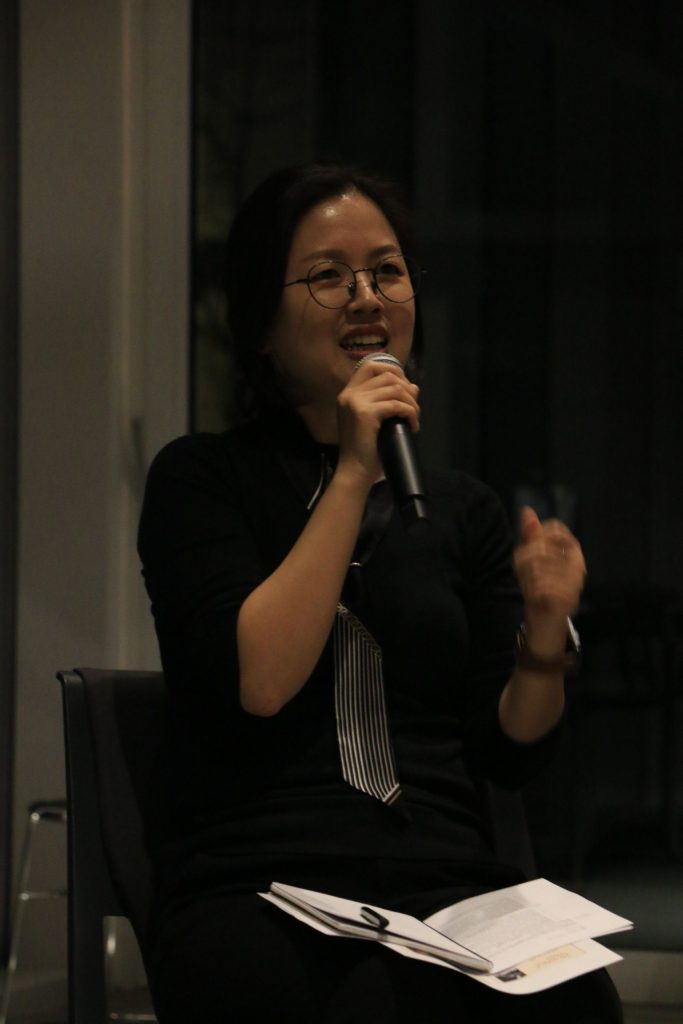Reported by Yongkun Vicky Wu, class of 2026
Religion + Protest is part of HRC’s Tuesday Night Conversation Series, Religion+X, hosted by the Religion+ research group. The informal conversations focus on the intersection between religion and a different topic each week and feature an array of faculty guest speakers.

Do religions support or resist the authorities? If so, in what way particularly? The Tuesday Religion + Protest Conversation, hosted by James Miller and featuring Hyun Jeong Ha (research interests include power, religion, sectarianism, and gender in the Middle East), Jesse Olsavsky (teaches and researches broadly in social movements, U.S. history and politics, and African American history) and Megan Rogers (research focuses on religion in contemporary China, and she has a particular interest in the intersection of religion and social inequality) revolved around the primary tactic (though not the only) of reinterpretation.
The host, James Miller opened the conversation by defining religion in a general sociological sense: religion is a force that shapes society, reinforcing authorities and/or resisting and challenging the dominant and empowering the victimized. Later on, each professor expressed their valuable viewpoint on the paradoxical issue.
 Professor Olsavsky started by listing two biblical figures, Cain, the oppressor who murdered his brother Abel, and Abel, the victimized. Oppressors would always vocalize religion in their cause and both sides need to negotiate with religion. Prof Olsavsky inspired us to look at the function of religion from two sides by quoting “The weapon of Cain has been religion” and “The weapon of Abel has also been religion.” Religion can serve the interest of both the dominant and the suppressed. It is the reinterpretation of narratives that makes the art of religion possible; alternative discourses are always invented for various purposes. Words inscribe power and religion has the capacity to do so.
Professor Olsavsky started by listing two biblical figures, Cain, the oppressor who murdered his brother Abel, and Abel, the victimized. Oppressors would always vocalize religion in their cause and both sides need to negotiate with religion. Prof Olsavsky inspired us to look at the function of religion from two sides by quoting “The weapon of Cain has been religion” and “The weapon of Abel has also been religion.” Religion can serve the interest of both the dominant and the suppressed. It is the reinterpretation of narratives that makes the art of religion possible; alternative discourses are always invented for various purposes. Words inscribe power and religion has the capacity to do so.
In addition, Prof Olsavsky continued to associate the civil rights movement and decolonization with religion, quoting the famous political philosopher Frantz Fanon “The last shall be the first.” The quote was widely used by liberation movements and books, including but not limited to The Governing Race and Unto This Last, demonstrating the tremendous influence of religion.

As the conversation went on, Professor Rogers proposed the resource mobilization theory, which refers to the mobilizing and collective power of depressed people in promoting social movements. In the process, religions offer the resources that can help social movements (both for and against). Nevertheless, in most cases, religions are hesitant to get involved and spark social dissent and tend to focus on inner bonding rather than bridging and building connections outside of the community. Transcendent beliefs can lead people to act irrationally. The question of whether religion (transcendent belief) is more motivating than social networks has inspired heated debates. In modern society, the rising importance of social networks can be seen in the case that in the United States, where political views were becoming increasingly polarizing, and people no longer pick a political party based on religious beliefs. Religions could, at times, be subjected to political belonging.
At this point, host James Miller proposed an interesting: can transcendent beliefs also appear in non-religion discourses? For instance, can nationalism be viewed as a form of transcendent belief? According to Prof Rogers, there are two definitions for religion in sociology: one is substantive, referring to super-human and natural power; another is functional. Durkheim holds that old religions will die and the new is yet to be born, but the transcendent need does not go away. In this respect, nationalism can function the same way as beliefs in society and motivate people.

Professor Ha further frames the question in the context of Egypt. She explores how religion and politics intersect and how Christians and Muslims interact. By giving an example of the Arab Spring, a democratic movement aiming to overthrow the authorities, she concluded that three motivations bring people together in the process (though not religion-motivated): the demonization of leaders (depicting leaders as Hitler or animals); national unity (prevalent); the brutality of the state. All the factors played a role like religions. Moreover, Prof Ha introduced Islamic feminism after the 2000s that reinterprets Hadith and other religious work to indicate that an alternative discourse serves the interest of minority groups as well.
In the end, host James Miller concluded that religion is powerful, whether it serves the dominant force or the victimized. The audience showed great interest in the topic and were looking forward to the next Religion + Music conversation.